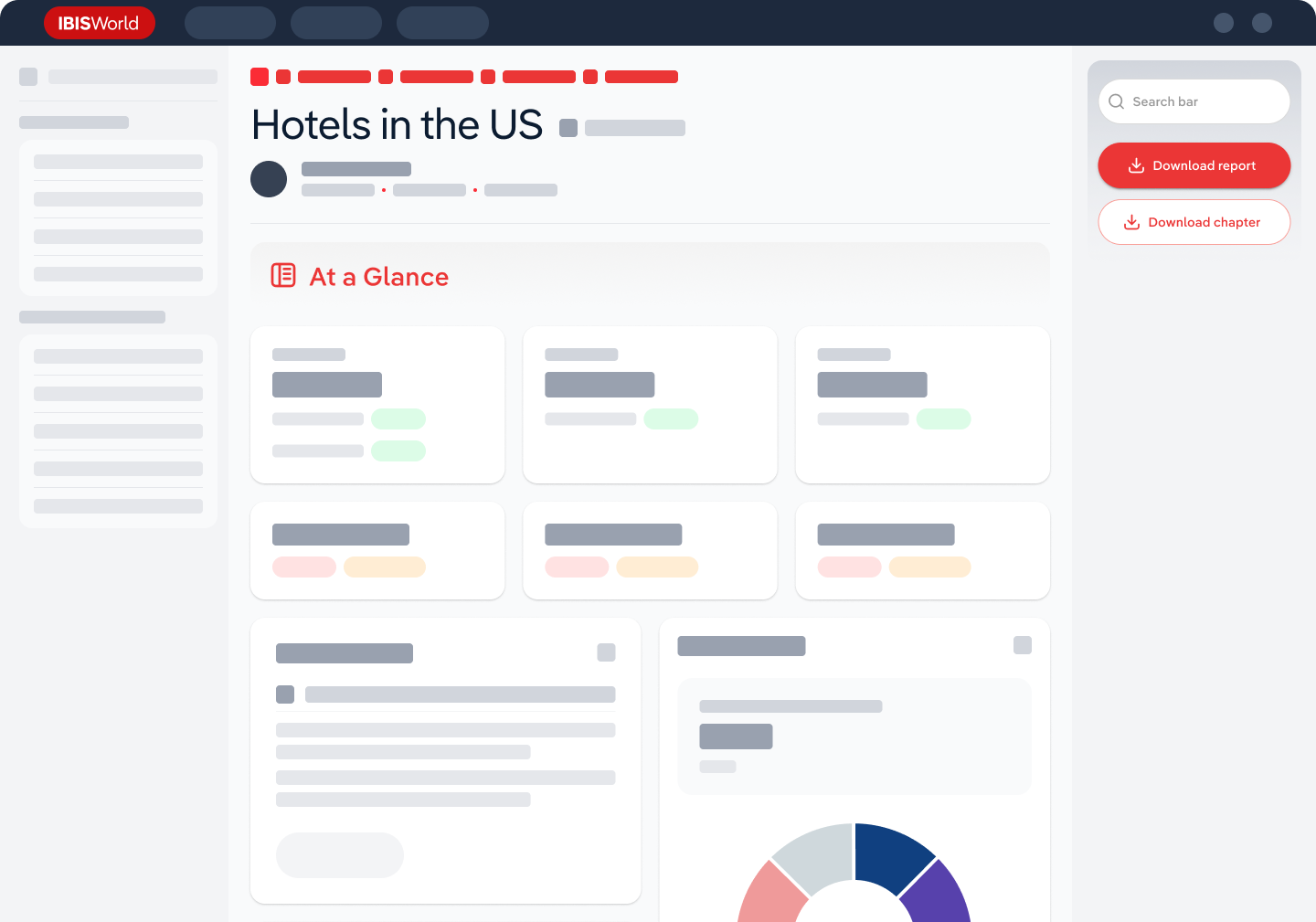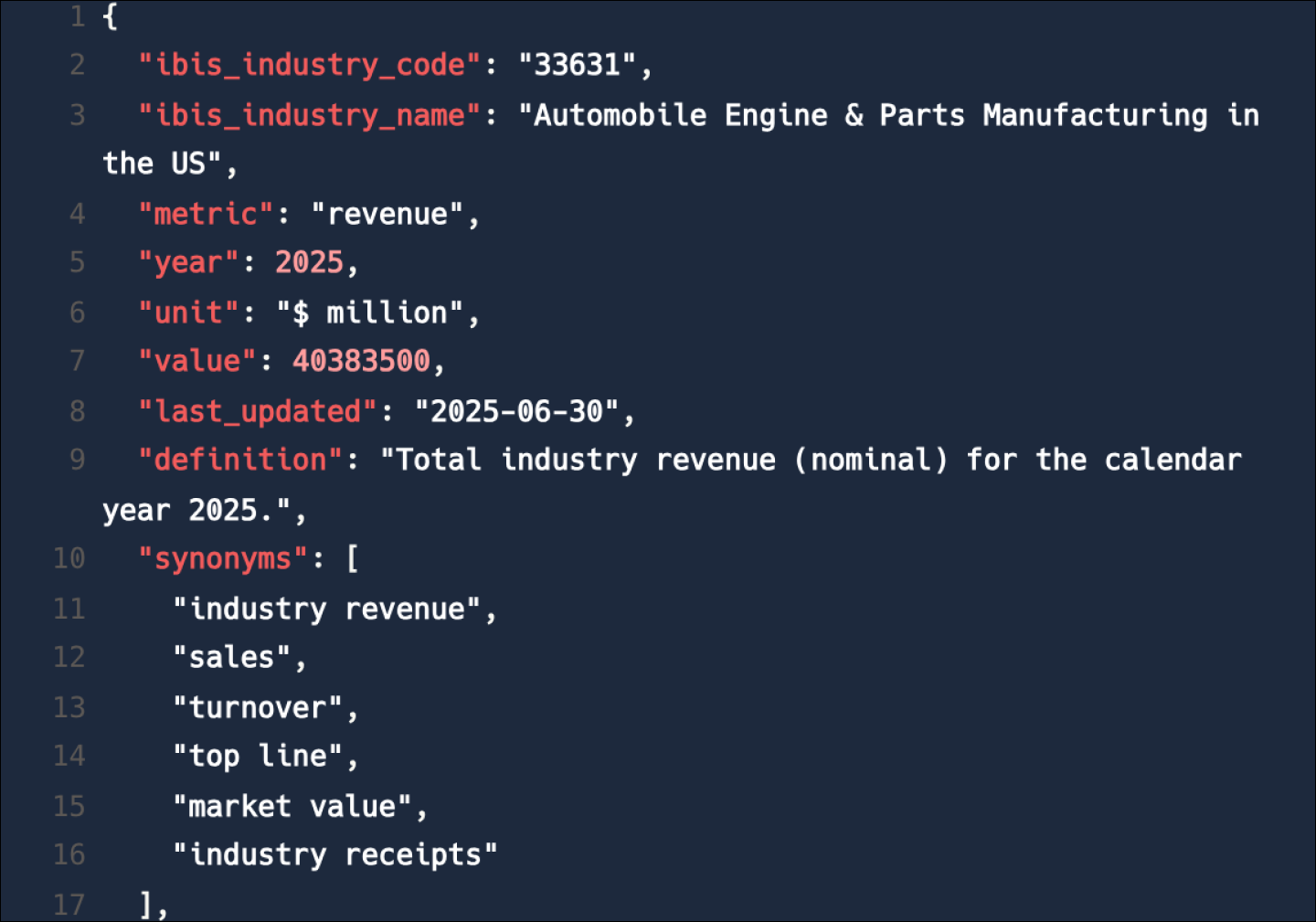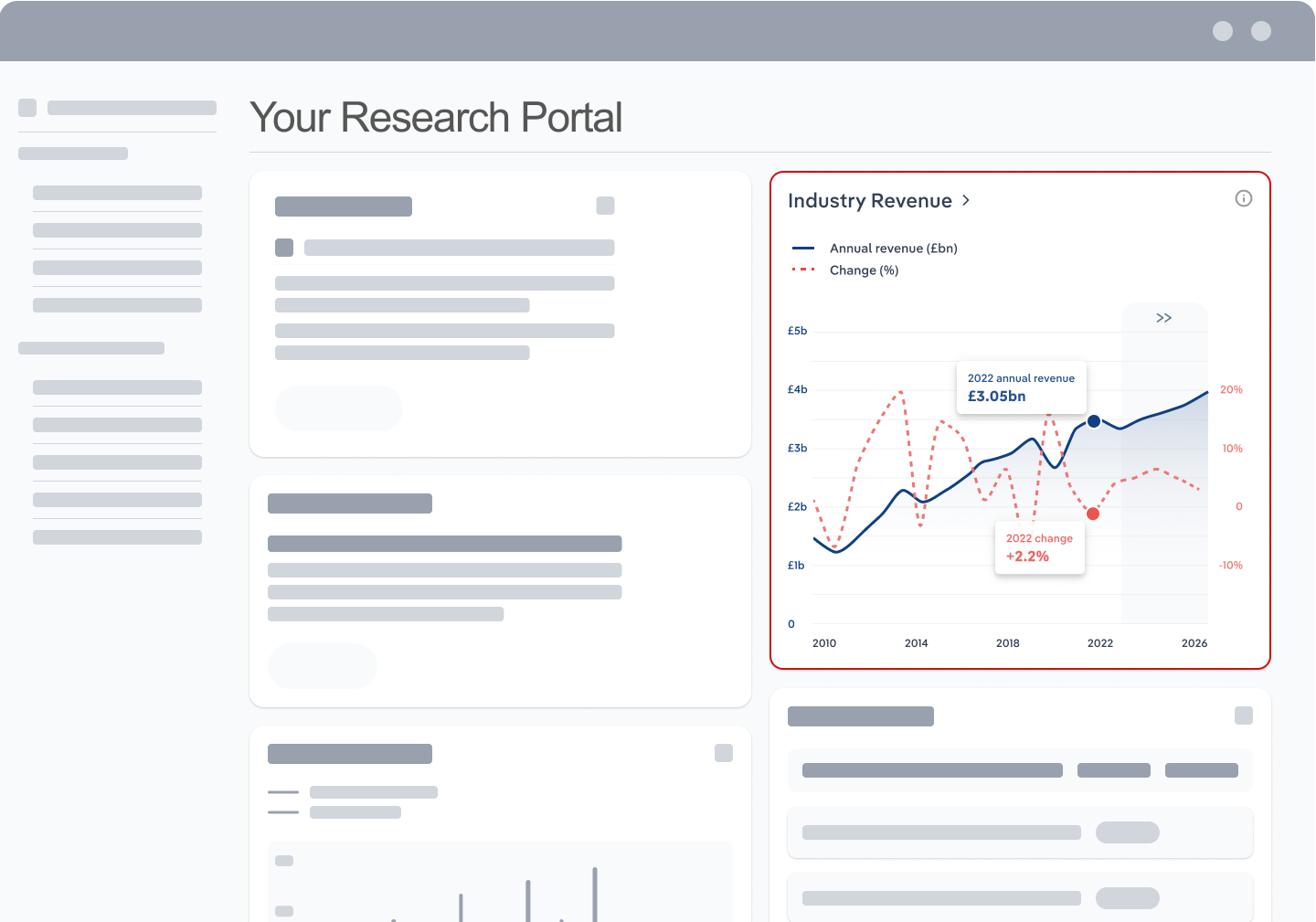Industry Statistics and Trends
Market size and recent performance (2015-2030)
Industry revenue has grown at a CAGR of 3.9 % over the past five years, to reach an estimated $1.8bn in 2025.
Trends and Insights
Diverse downstream demand propels the industry forward
- The ability to collaborate remotely has become increasingly important in the wake of the COVID-19 pandemic. Audio production studios equipped with remote collaboration tools and workflows can work with clients and collaborators from anywhere worldwide, expanding their reach and attracting clients who value flexibility and convenience.
- Additional trends and insights available with purchase
Industry outlook (2026-2031)
Market size is projected to grow over the next five years.
Trends and Insights
Studios benefit from growth in non-music audio content
- There is increasing demand for high-quality audio content beyond music, such as podcasts, audiobooks and sound design for video games and film. Studios are diversifying their offerings to include spoken word production, post-production for audiovisual works and live event recording.
Biggest companies in the Audio Production Studios in the US
| Company | Market Share (%)
2025 | Revenue
2025 | Profit
2025 | Profit Margin (%)
2025 |
|---|
There are no companies that hold a market share exceeding 5% in the Audio Production Studios in the US industry.
Products & Services Segmentation
Industry revenue is measured across several distinct product and services lines, including Postproduction, sound editing and design, Music recording and Radio recording. Postproduction, sound editing and design is the largest segment of the Audio Production Studios in the US.
Trends and Insights
Recording services keep the tape rolling
- Music recording includes all services for capturing, mixing and mastering tracks for albums, singles, ads and soundtrack contributions for major and independent musicians. Recording services for music clients have been steady, and this trend will continue despite the increasing popularity of self-produced and independently mastered projects among amateur artists.
- More insights available in the full report
Table of Contents
About this industry
Industry definition
Companies in this industry provide facilities and technical expertise for sound recording in a studio. Companies provide audio production or postproduction services for producing master recordings and may provide audio services for film, TV and video productions. After the recording has taken place, studios often perform postproduction services to adjust and master music recordings.
What's included in this industry?
Products and services covered in the Audio Production Studios industry in the United States include Sound recording production, Sound recording postproduction and mastering and Other sound recording production services.Companies
Companies covered in the Audio Production Studios industry in the United States include .Purchase this report to view all major companies in this industry.
Related Terms
Related terms covered in the Audio Production Studios industry in the United States include sampler, sequencer and synthesizer.Industry Code
NAICS 51224 - Audio Production Studios in the US
Performance
Get an indication of the industry's health through historical, current and forward-looking trends in the performance indicators that make or break businesses.
Analyst insights
Audio production studios are riding a wave of diverse demand, from streaming giants to booming podcast and advertising markets. As content needs climb, studios that offer rem...
In this chapter (4)
- Current Performance
- Outlook
- Volatility
- Life Cycle
Key metrics
- Annual Revenue, Recent Growth, Forecast, Revenue Volatility
- Number of Employees, Recent Growth, Forecast, Employees per Business, Revenue per Employee
- Number of Businesses, Recent Growth, Forecast, Employees per Business, Revenue per Business
- Total Profit, Profit Margin, Profit per Business
Charts
- Revenue, including historical (2015-2024) and forecast (2025-2030)
- Employees, including historical (2015-2024) and forecast (2025-2030)
- Businesses, including historical (2015-2024) and forecast (2025-2030)
- Profit, including historical (2015-2025)
- Industry Volatility vs. Revenue Growth
- Industry Life Cycle
Detailed analysis
- Trends in supply, demand and current events that are driving current industry performance
- Expected trends, economic factors and ongoing events that drive the industry's outlook
- Key success factors for businesses to overcome volatility
- How contribution to GDP, industry saturation, innovation, consolidation, and technology and systems influence the industry's life cycle phase.
Products and Markets
Learn about an industry's products and services, markets and trends in international trade.
Analyst insight
The imposition of tariffs is expected to raise costs for essential equipment like microphones, mixing consoles and software. This could force studios to either absorb these c...
In this chapter
- Products & Services
- Major Markets
Key metrics
- Largest market segment and value in 2025
- Product innovation level
Charts
- Products & services segmentation in 2025
- Major market segmentation in 2025
Detailed analysis
- Trends impacting the recent performance of the industry's various segments
- Innovations in the industry's product or service offering, specialization or delivery method
- Key factors that successful businesses consider in their offerings
- Buying segments and key trends influencing demand for industry products and services
Geographic Breakdown
Discover where business activity is most concentrated in an industry and the factors driving these trends to find opportunities and conduct regional benchmarking.
Analyst insights
The West's audio production industry thrives due to Hollywood's influence and technological innovation. With major labels and cutting-edge companies based in California, stud...
In this chapter (1)
- Business Locations
Charts
- Share of revenue, establishment, wages and employment in each state
- Share of population compared to establishments in each region in 2025
Tables
- Number and share of establishments in each state in 2025
- Number and share of revenue each state accounts for in 2025
- Number and share of wages each state accounts for in 2025
- Number and share of employees in each state in 2025
Detailed analysis
- Geographic spread of the industry across North America, and trends associated with changes in the business landscape
- Key success factors for businesses to use location to their advantage
Competitive Forces
Get data and insights on what's driving competition in an industry and the challenges industry operators and new entrants may face, with analysis built around Porter's Five Forces framework.
Analyst insights
Technological innovation encourages musicians to produce their recordings. Increasing access to secondhand recording equipment and affordable recording software has enabled a...
In this chapter (4)
- Concentration
- Barriers to Entry
- Substitutes
- Buyer & Supplier Analysis
Key metrics
- Industry concentration level
- Industry competition level and trend
- Barriers to entry level and trend
- Substitutes level and trend
- Buyer power level and trend
- Supplier power level and trend
Charts
- Market share concentration among the top 4 suppliers from 2020-2025
- Supply chain including upstream supplying industries and downstream buying industries, flow chart
Detailed analysis
- Factors impacting the industry’s level of concentration, such as business distribution, new entrants, or merger and acquisition activity.
- Key success factors for businesses to manage the competitive environment of the industry.
- Challenges that potential industry entrants face such as legal, start-up costs, differentiation, labor/capital intensity and capital expenses.
- Key success factors for potential entrants to overcome barriers to entry.
- Competitive threats from potential substitutes for the industry’s own products and services.
- Key success factors for how successful businesses can compete with substitutes.
- Advantages that buyers have to keep favorable purchasing conditions.
- Advantages that suppliers have to maintain favorable selling conditions.
- Key success factors for how businesses can navigate buyer and supplier power.
Companies
There are no companies that hold a market share exceeding 5% in the Audio Production Studios in the US industry.
Analyst insights
Due to the highly fragmented nature of the industry, there are no companies with a market share greater than 5.0%.
External Environment
Understand the demographic, economic and regulatory factors that shape how businesses in an industry perform.
Analyst insights
Audio production studios must comply with a web of copyright laws to avoid steep penalties. These include Title 17, the DMCA, and international agreements like TRIPS, all of ...
In this chapter
- External Drivers
- Regulation & Policy
- Assistance
Key metrics
- Regulation & policy level and trend
- Assistance level and trend
Charts
- Regulation & Policy historical data and forecast (2015-2030)
- Assistance historical data and forecast (2015-2030)
Detailed analysis
- Demographic and macroeconomic factors influencing the industry, including Regulation & Policy and Assistance
- Major types of regulations, regulatory bodies, industry standards or specific regulations impacting requirements for industry operators
- Key governmental and non-governmental groups or policies that may provide some relief for industry operators.
Financial Benchmarks
View average costs for industry operators and compare financial data against an industry's financial benchmarks over time.
Analyst insights
Wage expenses are rising as studios compete for specialized talent. The surge in immersive audio formats like Dolby Atmos has driven up demand for engineers, forcing top faci...
In this chapter
- Cost Structure
- Financial Ratios
- Key Ratios
Key metrics
- Profit margin, and how it compares to the sector-wide margin
- Average wages, and how it compares to the sector-wide average wage
- Largest cost component as a percentage of revenue
- Industry average ratios for days' receivables, industry coverage and debt-to-net-worth ratio
Charts
- Average industry operating costs as a share of revenue, including purchases, wages, depreciation, utilities, rent, other costs and profit in 2025
- Average sector operating costs as a share of revenue, including purchases, wages, depreciation, utilities, rent, other costs and profit in 2025
- Investment vs. share of economy
Data tables
- Industry Multiples (2018-2023)
- Industry Tax Structure (2018-2023)
- Income Statement (2018-2023)
- Balance Sheet (2018-2023)
- Liquidity Ratios (2018-2023)
- Coverage Ratios (2018-2023)
- Leverage Ratios (2018-2023)
- Operating Ratios (2018-2023)
- Cash Flow & Debt Service Ratios (2015-2030)
- Revenue per Employee (2015-2030)
- Revenue per Enterprise (2015-2030)
- Employees per Establishment (2015-2030)
- Employees per Enterprise (2015-2030)
- Average Wage (2015-2030)
- Wages/Revenue (2015-2030)
- Establishments per Enterprise (2015-2030)
- IVA/Revenue (2015-2030)
- Imports/Demand (2015-2030)
- Exports/Revenue (2015-2030)
Detailed analysis
- Trends in the cost component for industry operators and their impact on industry costs and profitability
Key Statistics
Industry Data
Data Tables
Including values and annual change:
- Revenue (2015-2030)
- IVA (2015-2030)
- Establishments (2015-2030)
- Enterprises (2015-2030)
- Employment (2015-2030)
- Exports (2015-2030)
- Imports (2015-2030)
- Wages (2015-2030)
Top Questions Answered
Unlock comprehensive answers and precise data upon purchase. View purchase options.
What is the market size of the Audio Production Studios industry in the United States in 2026?
The market size of the Audio Production Studios industry in the United States is $1.8bn in 2026.
How many businesses are there in the Audio Production Studios industry in the United States in 2025?
There are 25,267 businesses in the Audio Production Studios industry in the United States, which has grown at a CAGR of 6.2 % between 2020 and 2025.
How may import tariffs affect the Audio Production Studios industry in the United States?
The Audio Production Studios industry in the United States is unlikely to be materially impacted by import tariffs with imports accounting for a low share of industry revenue.
How may export tariffs affect the Audio Production Studios industry in the United States?
The Audio Production Studios industry in the United States is unlikely to be materially impacted by export tariffs with exports accounting for a low share of industry revenue.
Has the Audio Production Studios industry in the United States grown or declined over the past 5 years?
The market size of the Audio Production Studios industry in the United States has been growing at a CAGR of 3.9 % between 2020 and 2025.
What is the forecast growth of the Audio Production Studios industry in the United States over the next 5 years?
Over the next five years, the Audio Production Studios industry in the United States is expected to grow.
What does the Audio Production Studios industry in the United States include?
Sound recording production and Sound recording postproduction and mastering are part of the Audio Production Studios industry in the United States.
How competitive is the Audio Production Studios industry in the United States?
The level of competition is high and steady in the Audio Production Studios industry in the United States.
Methodology
How are IBISWorld reports created?
IBISWorld has been a leading provider of trusted industry research for over 50 years to the most successful companies worldwide. With offices in Australia, the United States, the United Kingdom, Germany and China, we are proud to have local teams of analysts that conduct research, data analysis and forecasting to produce data-driven industry reports.
Our analysts start with official, verified and publicly available sources of data to build the most accurate picture of each industry. Analysts then leverage their expertise and knowledge of the local markets to synthesize trends into digestible content for IBISWorld readers. Finally, each report is reviewed by one of IBISWorld’s editors, who provide quality assurance to ensure accuracy and readability.
IBISWorld relies on human-verified data and human-written analysis to compile each standard industry report. We do not use generative AI tools to write insights, although members can choose to leverage AI-based tools within the platform to generate additional analysis formats.
What data sources do IBISWorld analysts use?
Each industry report incorporates data and research from government databases, industry-specific sources, industry contacts, and our own proprietary database of statistics and analysis to provide balanced, independent and accurate insights.
Key data sources in the US include:
- US Census Bureau
- US Bureau of Labor Statistics
- US International Trade Commission
Analysts also use industry specific sources to complement catch-all sources, although their perspective may focus on a particular organization or representative body, rather than a clear overview of all industry operations. However, when balanced against other perspectives, industry-specific sources provide insights into industry trends.
These sources include:
- Industry and trade associations
- Industry federations or regulators
- Major industry players annual or quarterly filings
Finally, IBISWorld’s global data scientists maintain a proprietary database of macroeconomic and demand drivers, which our analysts use to help inform industry data and trends. They also maintain a database of statistics and analysis on thousands of industries, which has been built over our more than 50-year history and offers comprehensive insights into long-term trends.
How does IBISWorld forecast its data?
IBISWorld’s analysts and data scientists use the sources above to create forecasts for our proprietary datasets and industry statistics. Depending on the dataset, they may use regression analysis, multivariate analysis, time-series analysis or exponential smoothing techniques to project future data for the industry or driver. Additionally, analysts will leverage their local knowledge of industry operating and regulatory conditions to impart their best judgment on the forecast model.
IBISWorld prides itself on being a trusted, independent source of data, with over 50 years of experience building and maintaining rich datasets and forecasting tools. We are proud to be the keystone source of industry information for thousands of companies across the world.
Learn more about our methodology and data sourcing on the Help Center.










